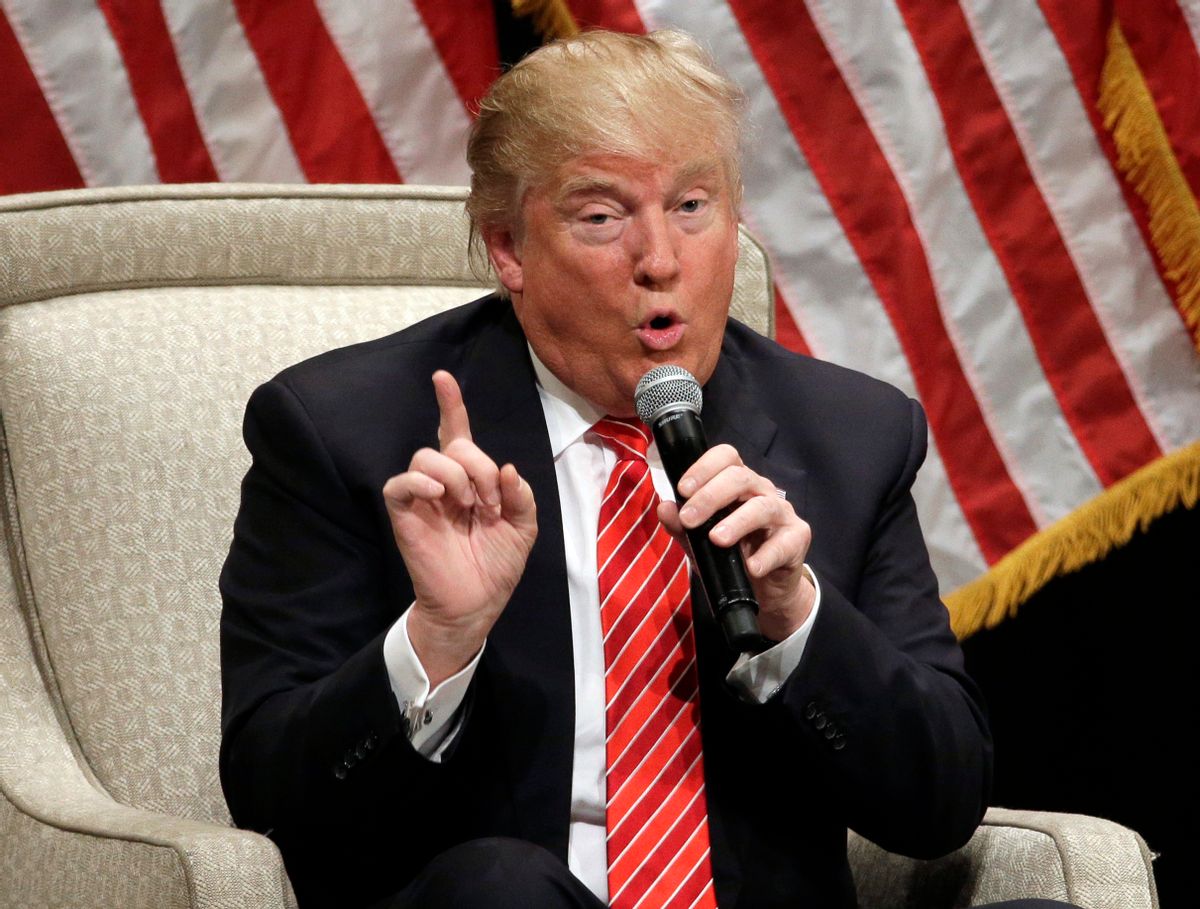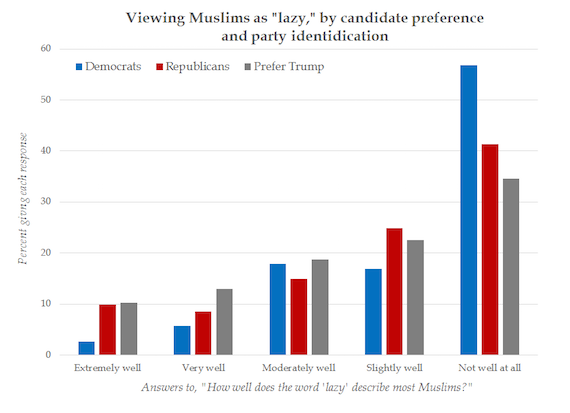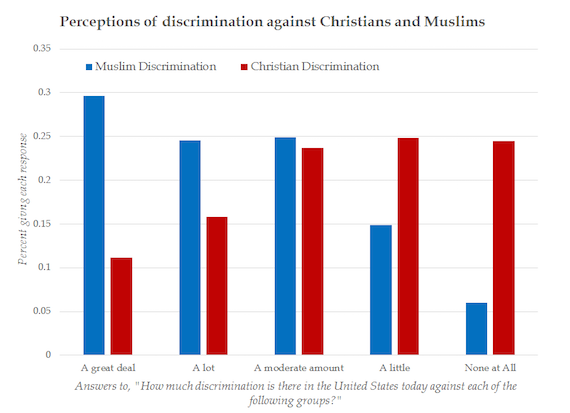Donald Trump is not a joke. After months of denying the reality of his appeal and laughing off the possibility he might be president, Trump’s victories in Florida, Missouri, Illinois and North Carolina on Tuesday have solidified his position as the likely GOP nominee. His staying power has led the pundit class to begin wondering what they missed. One is the persistence of Islamophobia in the United States and the extent to which it drives support for Trump.
We used the new American National Election Studies 2016 pilot survey to explore Trump’s persistence. ANES 2016 is a 1,200-person Internet survey performed by YouGov between Jan. 22 and 28 this year that includes a battery of questions about race. Though online surveys have drawn some minor criticisms, leading political scientists Stephen Ansolabehere and Brian Schaffner have shown that opt-in panel surveys are just as reliable as telephone surveys.
Based on the data, we find that Trump supporters are far more likely to express Islamophobic attitudes than other respondents, even other Republicans. The first question we examined asks, “How well does the word ‘lazy’ describe members of each group?” and includes blacks, whites, Hispanics and Muslims. The survey also asks the same question, except substituting the word "lazy" for “violent.” To explore how Trump supporters differ, we examine three categories: Republicans, Democrats and Trump supporters. The categories are not mutually exclusive: About half of Trump supporters are Republican, and half are independent or other. (Because the survey asked everyone whom they preferred in the Republican primary, we only counted self-identified Republicans and independents as Trump supporters.)
Our results are dramatic. More than a quarter of Trump supporters say that the word “lazy” describes Muslims “extremely” or “very” well, compared with about one-fifth of Republicans and less than one-tenth of Democrats. More than half of Democrats say the word describes Muslims “not well at all,” compared with about a third of Trump supporters.
While Trump supporters were slightly more likely to stereotype Muslims as lazy, they were dramatically more likely to stereotype Muslims as violent. A stunning 60 percent of Trump supporters say the word "violent" describes Muslims “very” or “extremely” well. For comparison, only 7 percent of Trump supporters said that the word "violent" describes white people extremely or very well. Nearly half of Republicans agree, compared with a bit more than a quarter of Democrats. Only 7 percent of Trump supporters said that the word “violent” describes Muslims “not well at all,” compared with about a quarter of Democrats.
Finally, the ANES pilot study also included a feeling-thermometer test, which asks respondents to place their feelings for different groups on a scale from 0 (very cold) to 100 (very warm). The model below shows that as a positive feeling toward Muslims increases, individuals become dramatically more likely to identify as Democrat, but less likely to identify as Republican or to support Trump. The model controls for age, gender and education. (Although the lines for Trump support and Republican identification are similar, our analysis shows the relationship is statistically stronger for Trump supporters.)
Yet, though most Trump supporters and Republicans believe that Muslims are violent (with nearly 80 percent of Trump supporters and 70 percent of Republicans saying the word describes Muslims “extremely,” “very,” or “moderately” well), the reality is that violence against Muslims is on the increase. According to FBI statistics, compiled by Christopher Ingraham, in 2001, hate crimes against Muslims increased by a factor of 10, and have been around “five times higher than the pre-9/11 rate” since then. While hate crimes against all other groups dropped in 2014, hate crimes against Muslims increased nearly 14 percent. In the wake of the Paris terrorist attack, the New York Times reported that,
“hate crimes against Muslim Americans and mosques across the United States have tripled.” The crimes committed included “assaults on hijab-wearing students; arsons and vandalism at mosques; and shootings and death threats at Islamic-owned businesses.”
Widespread Islamophobia also helps explain why even the most extreme anti-Muslim rhetoric hasn’t harmed Republican candidates. Though it is easy to single out Trump for approvingly citing a right-wing myth about executing Muslims with bullets dipped in pig’s blood, the comments of mainstream GOP candidates have been nearly as disturbing. In an interview after Trump’s call for a ban on Muslims entering the United States, Ted Cruz called for restricting entry from some countries, but with exemptions that Greg Sargent reports were “widely seen as an effort to exempt from the ban refugees who are Christian or non-Muslim.” Marco Rubio, often seen as a moderate on the right, likewise tried to downplay hostility toward Muslims, while emphasizing what he described as a bias in the Obama administration against Christians.
It’s worth noting that according to ANES 2016, respondents were far more likely to perceive discrimination against Muslims than Christians (see chart). According to ANES 2016, the mean feeling score for Muslims was 50, dramatically lower than the mean score for Whites, 72.
As political scientist Jason McDaniel has shown (along with one of the authors of this piece), there is strong reason to believe right-wing media is fostering these Islamophobic stereotypes. They write,
“Republicans who watch Fox News regularly, compared to other Republicans, are slightly (but statistically significantly) more likely to say that “violent” describes Muslims well. Democrats who watch Fox News regularly are dramatically more likely to say that “violent” describes Muslims well than other Democrats. In fact, Democrats and Republicans who watch Fox News regularly are equally likely to say that violent describes Muslims well.”
Consider the right’s reaction in 2010 to plans to construct an Islamic community center in Lower Manhattan, infamously dubbed "the Ground Zero mosque." Leading Republicans including John McCain, Sarah Palin, Mitt Romney and Newt Gingrich all condemned the building, often in strongly Islamophobic language. One particularly odious political ad -- funded by a Koch-backed political nonprofit and targeting a Democratic congressman from Iowa who had supported the community center -- gravely issued the following warning:
“For centuries, Muslims built mosques where they won military victories. Now, they want to build a mosque at Ground Zero, where Islamic terrorists killed 3,000 Americans. It’s like the Japanese building at Pearl Harbor.”
A study on the controversy finds those who relied heavily on Fox News were more likely to believe false rumors about the cultural center and mosque—for example, that the imam who supported it was a terrorist sympathizer.
The explanation of Trump’s success is simple: The latent racism, xenophobia and other powerful social forces fostered by the right for decades have simply been extended by Trump to their next logical extreme. As racial scholar Ian Haney-Lopez writes,
“[George W.] Bush was careful to cabin his remarks in terms of extremists and ‘a perverted visions of Islam,’ but the global terms in which he framed his analysis belied such fine distinctions.”
That is, Bush’s language “was operating more in the register of a dog whistle, a way to advance a basically racial message while still maintaining plausible deniability.” Even today, Bush is seen as more moderate on issues related to Islamophobia. But the aggressive domestic surveillance policies he pursued, and the rhetoric of the last few years indicate Islamophobia was ripe on the right. Trump is just the most successful politician to date at picking the fruit.
Philip Cohen is a sociologist at the University of Maryland, who runs the blog Family Inequality. Follow him on Twitter at @familyunequal.





Shares